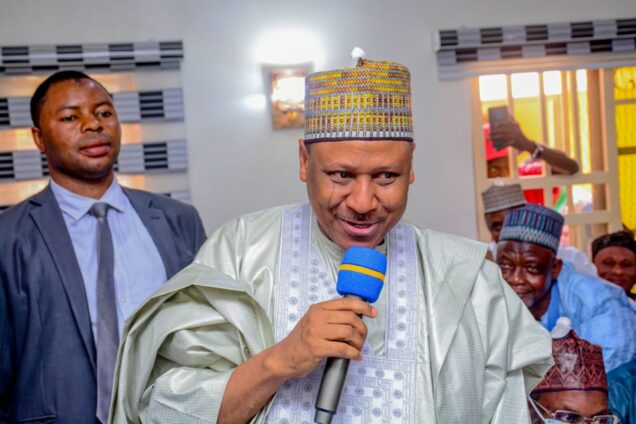 Unlike Zimbabwe or South Africa, Nigeria didn’t fight a war of liberation to achieve national independence. The Nationalist Press, rightly or wrongly, lays claim to having secured this for this country without a shot being fired. This is a realistic claim, considering that the nationalist who’s who is largely made up of journalists, including Dr. Nnamdi Azikiwe, Chief Awolowo, Sa’adu Zungur, Abubakar Imam, Aminu Kano and the rest of them.
Unlike Zimbabwe or South Africa, Nigeria didn’t fight a war of liberation to achieve national independence. The Nationalist Press, rightly or wrongly, lays claim to having secured this for this country without a shot being fired. This is a realistic claim, considering that the nationalist who’s who is largely made up of journalists, including Dr. Nnamdi Azikiwe, Chief Awolowo, Sa’adu Zungur, Abubakar Imam, Aminu Kano and the rest of them.
Reading the press some of times, you wonder if this galaxy of nationalist writers had not gifted a toothless tiger to the people of Nigeria.
I do not share the view that the glaring omissions on the part of the mainstream media is made up for by the courageous work against sloth, inefficiency and routine corruption by the new media.
Mainstream media need to do more than just breaking the story. It is simply unacceptable that they limit themselves to merely reporting incidents and events in an isolated sense. There has to be contextualizing, interpretation and follow-up. Without these; without the media clearing the way, this country will run into a stampede. One way of correcting this glaring omission is for the media to make our rulers to think of duty before perks. Even when the media have to pursue commercial interests to survive a business, today’s media must not blindside human dimensions to events they report.
Many have accused this country’s press of dwelling mostly on mundane issues of appetite as tragedies creep in day after day; that commercial interests are at times placed above public good. When you critically examine many of them, you come to dislike the short shrift they give to life-consuming incidents arising from the continuing failure to force public officials to come to account for their misdeeds.
Week after week, this country grapples with major tragedies, the one for this week over-writing the one before and the one in the week ahead almost certainly to surpass the one witnessed this week. In large measure, the media are culpable because they restrict themselves to merely breaking the story. Without a follow-up and the needed follow through, the media help to keep culprits, including judges, administrators and politicians well out of the reach of justice.
Take these three tidbits for a taste. The media did the duty of breaking the Boxing Day mishap that killed 50 mostly young men and women in a boat mishap in River Buruku, a tributary of River Benue in Buruku Local Government Area of Benue State. The tragedy happened owing to engine failure. “The villagers,” as reported by the Guardian, “say that such incidents were common place because life jackets were both alien to operatives and passengers even as government has not taken steps to enforce its necessity so as to avoid incessant deaths”.
This “killer River” as it has come to be known, separates Buruku with Logo Local Government, Governor Gabriel Suswan’s native area. According to the Guardian, “the federal government had in the past awarded a contract for a bridge “but that money had disappeared or “eaten up” according to common parlance. The state transport company, Benue Links, which provided a more reliable ferry, had had its services “grounded by corruption”. Since reporting this incident, you ask the question, which are the media that followed up to establish the culpability or lack of it on the part of officials or government agencies?
Who has deemed it necessary to take government to task to ensure this did not occur again? What are the immediate, long-term and restorative measures anyone has taken to avert these kinds of deaths?
In October in 2013 in Niger State, two similar incidents occurred. At a point near Malali on the River Niger, a boat built to carry 80 passengers sank with 150 on board. Forty-two of the passengers, mostly women and children died. One hundred were declared missing. From this point, the media lost interest in the story and moved to other things. The actual losses remain therefore matter of conjecture. Within six days of this incident, another one occurred at Kokoli, a walking distance from Malali. This boat was meant for 30. It sank with 80 passengers with their goods. Eighteen of them died.
In December 2013 in Bayelsa State, 12 persons died in another boat mishap and in Lagos, four days later, four of the 80 passengers died in yet another boat mishap.
Worried about his endless chain of boat mishaps, the Sun in October last year wrote an editorial in which they warned that “the time has come for federal, state, local governments and their agencies to beam their searchlights on transportation along our inland waterways, with a view to arresting the hazards and improving safety… we should begin to put value on some of the lives of our fellow citizens who have no other option than to use boats and the inland waterways”.
To me honestly, journalism can avert most of these, but it is not editorials that will do it. This is something they can help the nation do by holding officials and government agencies to account with regard to their discharge of responsibilities in these incidents. The Guild of Editors, the human rights community and lawyers may also form a formidable coalition to help victims of these acts negligence get their rights and compensation in cases of loss of life and property.
Failure of Waterways, or of Journalism? By Garba Shehu
Follow Us On WhatsApp



